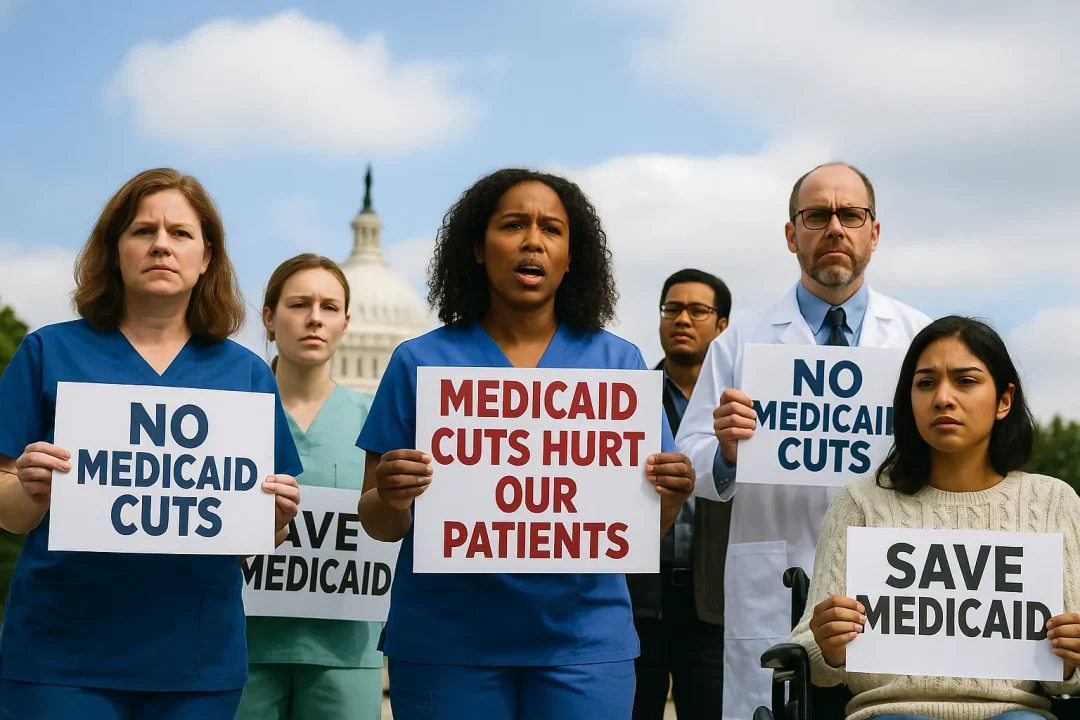Proposed Republican-backed cuts to Medicaid are sparking urgent backlash from across the country, as nurses, healthcare professionals, and disability rights advocates warn of devastating consequences for millions of vulnerable Americans.

The proposed reductions, currently part of the broader GOP fiscal plan moving through the Senate, would slash funding to Medicaid by billions over the next decade, a move critics say will leave low-income families, seniors, and people with disabilities without vital access to care.
What’s in the GOP Plan?
Senate Republicans are pushing forward with a package that includes steep Medicaid cuts, framing them as part of a larger effort to reduce federal spending and trim the national deficit.
Though final details are still being negotiated, the reductions would cap Medicaid spending growth, shift more financial responsibility to states, and potentially restrict eligibility for millions.
Analysts say the cuts could reduce federal Medicaid funding by over $700 billion in the next 10 years, according to projections from the nonpartisan Congressional Budget Office.
Nurses Take the Fight to Washington
This week, frontline nurses from Michigan traveled to Washington, D.C. to directly lobby lawmakers and demand that they reject the proposed Medicaid cuts.
Organized by the Michigan Nurses Association, the group of nurses emphasized that Medicaid is essential to both their patients and the hospitals where they work.
“Cuts like these will devastate our communities,” said Liz Kovar, an emergency department nurse from Flint. “Our patients don’t just disappear when coverage vanishes — they show up sicker, in crisis, with nowhere else to turn.”
The nurses expressed concern not just about the immediate impact on patients, but also about the broader collapse of rural hospitals and community clinics that depend on Medicaid reimbursements to survive.
Fear Among Americans With Disabilities
The proposed cuts have ignited fear in the disability community. On MSNBC, disability advocates described the GOP plan as a direct threat to their independence and access to life-sustaining care.
“People like me rely on Medicaid for personal care attendants, medical equipment, and therapy,” said one advocate. “Without this support, we risk being institutionalized or worse.”
Advocacy groups estimate that more than 10 million Americans with disabilities rely on Medicaid services. For them, the program isn’t just a health safety net — it’s a lifeline.
Who’s Most at Risk?
If the current version of the Medicaid proposal becomes law, here’s who could be hit hardest:
- Low-income families with children
- Seniors who depend on Medicaid for long-term care
- People with disabilities requiring in-home support services
- Rural Americans with limited access to healthcare providers
- Hospitals and nursing homes that rely heavily on Medicaid reimbursements
Political Fallout
Democrats have vowed to fight the proposal, with Senator Bernie Sanders (I-VT) calling it “immoral and outrageous.”
Several moderate Republicans have also expressed concern, warning that cutting Medicaid during a period of economic uncertainty could backfire politically and practically.
What’s Next?
The bill is expected to move through the Senate Budget Committee in the coming weeks, with a potential floor vote later this summer.
Medicaid advocates across the country are urging constituents to contact their senators and voice their opposition.
For now, the future of the nation’s largest public health program hangs in the balance — and the lives of millions of Americans hang with it.
Stay informed and protect your health. Medicare and Medicaid provide essential coverage for over 150 million Americans — understanding your eligibility, benefits, and upcoming policy changes is vital to maintaining access to care.
For personalized assistance or the latest updates, visit Medicare.gov, Medicaid.gov, or call 1-800-MEDICARE (1-800-633-4227).
